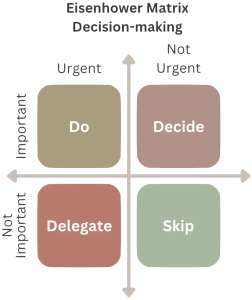
10 Apr Multicosts of Multitasking
Apr 10, 2024
A research study from the University of London suggests that multitasking, which involves switching from one context to another, affects your brain similarly to a night without sleep. Participants who multitasked during cognitive tasks experienced drops as many as 15 IQ points.
Another study by Stanford University indicates that people who frequently engage with multiple types of media at once perform worse on simple memory tasks.
Switching between tasks incurs cognitive costs, leading to reduced performance accuracy and speed. This is because switching requires more neural processing to change task goals and reallocate attention to new information.
Also, there are ongoing researches attempting to answer whether multitasking can lead to permanent damage to our brains.
Me time
Unfortunately, multitasking has become a part of our lives, likely a product of the modern society.
Given the costs associated with multitasking and the fact that this is how the world operates, how do we cope with this?
One simple exercise is to practice periodic solitude, also known as ‘me time.’
‘Me time’ is a state of mind where an individual can focus on their own thoughts without any distractions, allowing the brain to concentrate on a single task or none.

A business advantage
Being able to practice periodic solitude can be a powerful personal and business advantage, as it literally enhances your IQ and cognitive abilities.
Consider this perspective. In today’s world, many people are bombarded with a large number of information streams and tasks. This leads to the necessity of multitasking, which, in turn, can diminish their cognitive abilities.
Changing your behaviour, on the other hand, demands energy and cognitive effort. It seems like a catch-22 situation – a trap.
Therefore, practicing periodic solitude isn’t an easy task, but once mastered, it becomes an advantage.
How to achieve “me time”?
Reduce distractions
- Reduce tasks: Take your calendar, and list all your major obligations and tasks for the next year. Focus on completing as many as you can. Ideally, you should have no more than one major task per month in the next 12 months.
- Avoid new tasks: When presented with a new obligation, think twice: Can I fulfil it? Is it worth it? Avoid accumulating unnecessary obligations; focus only on the essential ones.

- Examine your social media: Scroll back as far as you can, reading your old posts and comments. Reflect on whether the people who interacted with you then are still part of your life and whether the time spent on these posts was truly worthwhile. If your social media use seems more draining than beneficial, consider deleting your account or simply reducing your usage.
- Turn off notifications: On your mobile phone, disable notifications for all non-essential apps. Keep only critical ones like messengers and calls.
- News-less life: Limit your exposure to stressful news. According to the news, the world ends every day. Fear and stress sell.
- Less calls: If feasible, reduce the number of calls and meetings in your work schedule.
Plan periods for solitude
Due to high inflation, the cost of producing and delivering goods has increased drastically in the last few years. Therefore, a startup that can offer reduced logistical expenses and facilitate customer access to goods would have great potential. As I am writing this, I can immediately name one startup that already does that — a startup company based in Bulgaria, EU founded by a friend of mine.
Key Takeaways
- Multitasking, absorbing information from numerous channels, and experiencing stress can significantly diminish our IQ and cognitive abilities.
- Minimise distractions and reduce stress factors to enhance your brain health.
- Solitude, or “me time” is essential for maintaining good health, a high IQ, and good cognitive abilities. This becomes a business advantage as it boosts productivity, improves decision-making, and your visionary thinking.
References
“Multitasking Damages Your Brain And Career, New Studies Suggest” by Travis Bradberry
“A decade of data reveals that heavy multitaskers have reduced memory, Stanford psychologist says“ by Stanford news
“Multicosts of Multitasking” by Kevin P. Madore, Ph.D. and Anthony D. Wagner, Ph.D.
